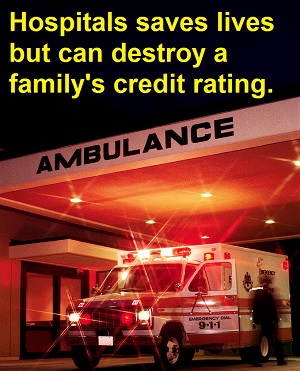 Even with the Affordable Care Act extending health insurance to millions of Americans, medical debt can still be a burden to many families. Toni Turner of Financial Education Services was kind enough to put together this summary of surviving medical debt and restoring damaged credit ratings
Even with the Affordable Care Act extending health insurance to millions of Americans, medical debt can still be a burden to many families. Toni Turner of Financial Education Services was kind enough to put together this summary of surviving medical debt and restoring damaged credit ratings
Surviving medical debt
A serious illness or injury can be especially troublesome. Aside from recuperating, you’ll likely be overwhelmed for a short time, as you attempt to put your work and family life back together.
Sadly, there’s an additional risk your credit score could be affected by a visit to your healthcare facility. In the event that an unpaid account gets reported to the credit bureaus, your FICO score could reflect this negative item for years to come. If you’re not clear on how unpaid medical accounts can affect your credit, please continue to read the information below.
Unpaid medical bills go to collections
Unlike a bank or credit union, medical facilities do not have an immediate relationship with the three credit agencies (TransUnion, Equifax and Experian). If an account goes unpaid after numerous attempts to resolve the issue, the medical facility will refer your account over to a collection agency. At that point, the item in collections is then reported to the credit bureaus. The result is a negative item on your credit report. Your FICO score will be impacted as well, as your the rating is profoundly impacted by your history of on time payments. Your FICO represents 35% of your credit score calculation, including:
- Current payment record for car loans, mortgages, retail accounts, installment loans, credit cards, etc. on paid as agreed accounts
- Public records (bankruptcies, foreclosures, wage garnishments, liens and judgments)
- Severity of delinquency (length of time past due)
- Amount past due on accounts or collections
- Recent reporting of a delinquency or public record or collection
- Number of past due or derogatory accounts
Collection agencies can add damage
As of August 2014, the credit scoring model most loan specialists depend on, views paid and unpaid collection accounts the same. This implies that regardless of the fact that you pay off the collection agency, it is not likely that your score will increase right away. The best thing to do for this situation is to be patient and proceed using credit cards very cautiously (no more than 30% charged to each card) while you continue to pay your other bills on time.
Restoring damaged credit ratings
What if you paid your bill, but still were reported to a collection agency? There are steps you can take to have it excluded from your credit report:
- Gather documentation – Collect as much documentation as you can to prove that the bill was paid. Request installment records from your health care professional’s office. Make duplicates of invoices/cancelled checks and incorporate them with your dispute letter.
- Send a dispute letter – Alert the credit departments that you’re questioning the account in collections. Send a letter to the agencies reporting the derogatory (make a point to check every one of the three of your credit reports to evaluate which ones got the wrong data). Make sure to incorporate documentation of your case.
- Follow up – The Fair Credit Reporting Act obliges the credit authorities to catch up on all credit reporting mistakes. Continue communication with the credit bureaus as it may take several months before the information is verified and the derogatory(s) are removed, or enlist the assistance of a trustworthy credit repair specialist.
Moving forward, there are steps you can take to keep future hospital expenses from negatively influencing your credit:
- Pay bills when they come in – If you owe an amount your insurance won’t cover, pay the bill when it comes in.
- Connect with your insurance agent/company – Find out ahead of time, what your coverage includes, deductible amounts and network of doctors included in your plan. Many people assume coverage, when in fact, there may is a procedure you authorized that is not covered in full.
- Make payment arrangements – When faced with bills you cannot pay immediately, be sure and reach out to your healthcare professional. Speak with someone in the billing department. Surprisingly, many are understanding of most situations and will be willing to work out an affordable repayment plan for you.
The bottom line – unpaid medical bills can have a negative impact for many months. Good communication with doctor’s office and insurance providers can do much to eliminate the likelihood of dealing with results of unpaid medical bills.
As a side note, if you stop paying your health insurance premiums, the health plan will be cancelled back to the last full months payments. Unpaid health insurance premiums are not reported as uncollected debt. Only services you receive, even while insured, such as any deductible and coinsurance amounts, can go into collections for non-payment.- Kevin
 Toni Turner is an independent agent with Financial Education Services helping individuals and families repair damaged credit ratings.
Toni Turner is an independent agent with Financial Education Services helping individuals and families repair damaged credit ratings.


